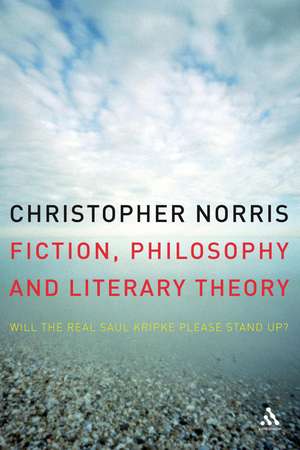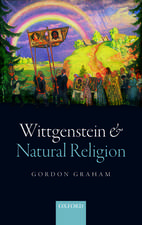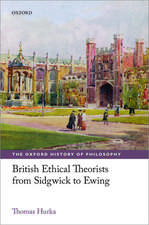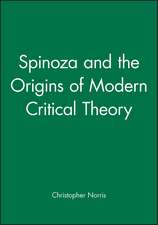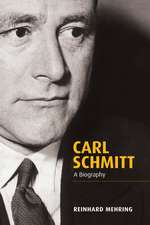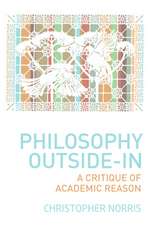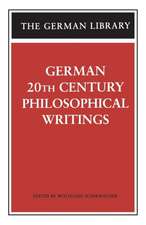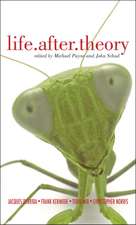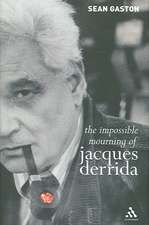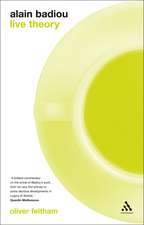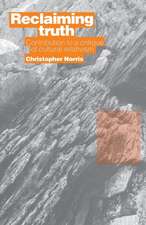Fiction, Philosophy and Literary Theory: Will the Real Saul Kripke Please Stand Up?
Autor Professor Christopher Norrisen Limba Engleză Paperback – 27 iun 2007
This book brings together three main topics - deconstruction, philosophy of language, and literary theory - that have figured centrally in Christopher Norris's work over the past two decades. It offers a refreshingly clear and vigorous statement of his views as to how 'theory' might profit from a greater awareness of current philosophical debates while philosophy might likewise gain by adopting a more open-minded attitude toward developments in literary theory. Most significant here is Norris's continuing exploration of the various points of contact between Jacques Derrida's thought and the kinds of concern - especially with issues in philosophical semantics and speech-act theory - that have preoccupied thinkers in the 'other', mainstream-analytic line of descent. However his focus is consistently on matters that should be of interest to philosophers and literary theorists alike.
Thus Norris devotes some penetrating commentary to topics such as modal or 'possible-worlds' logic as it bears upon issues in narrative theory; the 'two cultures' (science versus literature) controversy; the different ways in which literary theory has alternately embraced and rejected the appeal to 'scientific' modes of analysis; and some possible reasons for Wittgenstein's well-known aversion to Shakespeare. He also suggests a novel approach to the free-will/determinism issue by way of debates about the nature of language and the scope it affords for expressive creativity despite - or owing to - the limits imposed by various structural constraints.
Altogether this important new book provides a welcome overview of the author's current thinking and an equally welcome enlargement of horizons in contrast to the narrowly specialised character of much present-day academic discourse.
Thus Norris devotes some penetrating commentary to topics such as modal or 'possible-worlds' logic as it bears upon issues in narrative theory; the 'two cultures' (science versus literature) controversy; the different ways in which literary theory has alternately embraced and rejected the appeal to 'scientific' modes of analysis; and some possible reasons for Wittgenstein's well-known aversion to Shakespeare. He also suggests a novel approach to the free-will/determinism issue by way of debates about the nature of language and the scope it affords for expressive creativity despite - or owing to - the limits imposed by various structural constraints.
Altogether this important new book provides a welcome overview of the author's current thinking and an equally welcome enlargement of horizons in contrast to the narrowly specialised character of much present-day academic discourse.
| Toate formatele și edițiile | Preț | Express |
|---|---|---|
| Paperback (1) | 306.09 lei 6-8 săpt. | |
| Bloomsbury Publishing – 27 iun 2007 | 306.09 lei 6-8 săpt. | |
| Hardback (1) | 1004.49 lei 6-8 săpt. | |
| Bloomsbury Publishing – 27 iun 2007 | 1004.49 lei 6-8 săpt. |
Preț: 306.09 lei
Preț vechi: 333.61 lei
-8% Nou
Puncte Express: 459
Preț estimativ în valută:
58.58€ • 60.93$ • 48.36£
58.58€ • 60.93$ • 48.36£
Carte tipărită la comandă
Livrare economică 14-28 aprilie
Preluare comenzi: 021 569.72.76
Specificații
ISBN-13: 9780826497567
ISBN-10: 082649756X
Pagini: 272
Dimensiuni: 156 x 234 x 20 mm
Greutate: 0.41 kg
Editura: Bloomsbury Publishing
Colecția Continuum
Locul publicării:London, United Kingdom
ISBN-10: 082649756X
Pagini: 272
Dimensiuni: 156 x 234 x 20 mm
Greutate: 0.41 kg
Editura: Bloomsbury Publishing
Colecția Continuum
Locul publicării:London, United Kingdom
Cuprins
Introduction
1. Deconstruction, Analysis and Deviant Logic: Derrida 'at the Limits of Thought'
2. Ethics, Normativity and Deconstruction
3. Saussurean Linguistics as Model and Metaphor: The Structuralist 'Revolution' Revisited
4. Translation to Tralfamadore: Images of Science in Literary Theory
5. Will the Real Saul Kripke Please Stand Up?: Fiction, Philosophy and Possible Worlds
6. Extraordinary Language: Why Wittgenstein Didn't Like Shakespeare
Recenzii
"Norris has provided a highly elaborate yet consummately clear reflection regarding the intersections between philosophy and literary theory... His book is a welcome contribution for scholars and advanced students interested in rethinking the supposed analytic-Continental divide. Summing Up: Recommended. Graduate students and faculty/researchers." -CHOICE
